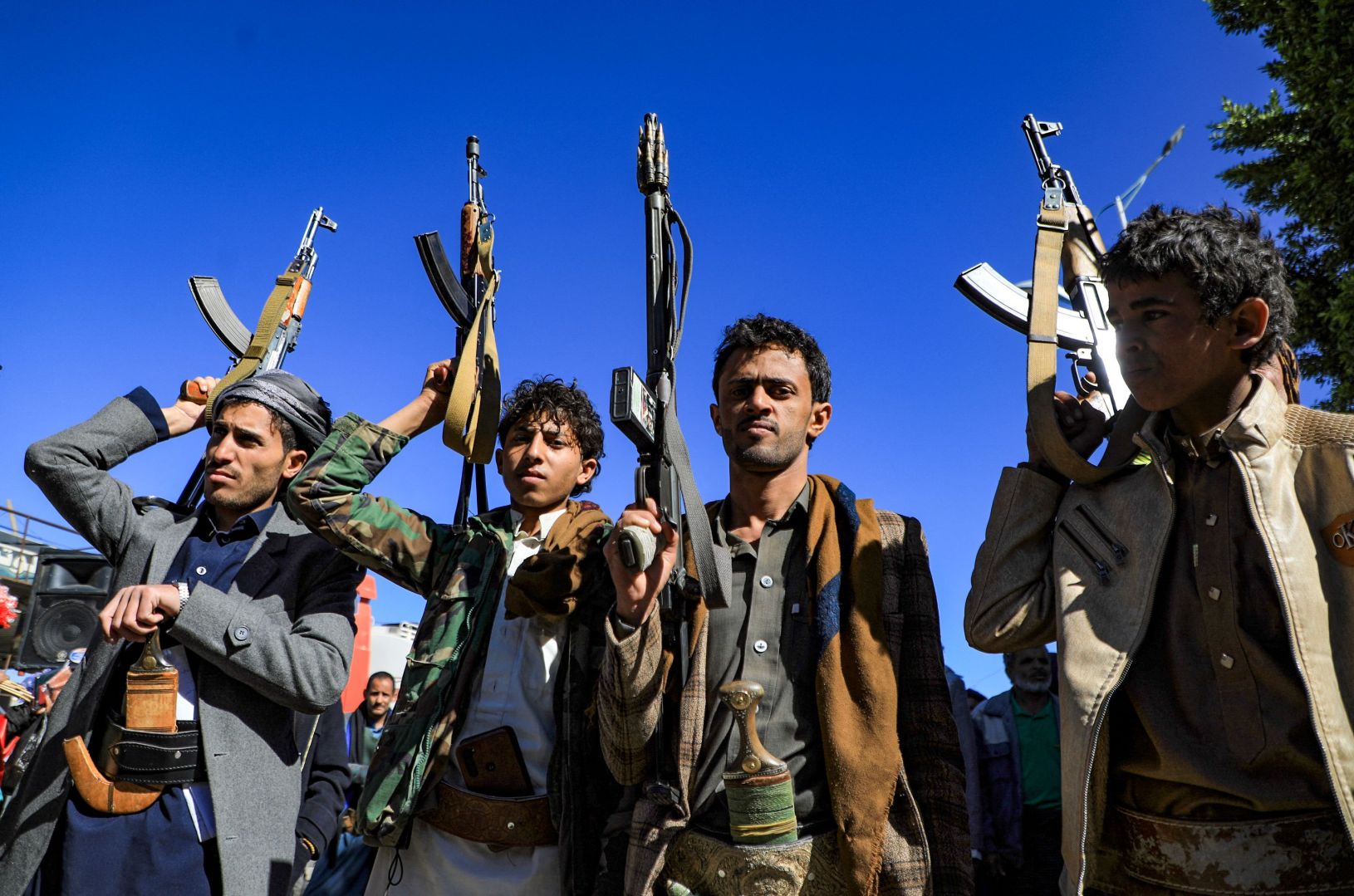
Commentary
-
Our commentary partners will help you reach your own conclusions on complex topics.
Hope of a permanent ceasefire that would end Yemen’s eight-year civil war is blossoming. Many analysts view the recent rapprochement between Saudi Arabia and Iran as a thawing of regional tensions and the opening of a possibility that Iran could help bring peace to Yemen. The Houthis just agreed to restore a lapsed truce for six months, creating a window for direct negotiations. The United States and international community have welcomed these progressions because peace has been a long time coming in Yemen. But today’s news might not be as good as it seems for Yemen, for the region, and for the United States.
For background, Saudi Arabia, at the request of the internationally recognized Yemeni government, launched a military intervention in March 2015 to unseat the Houthis who had seized control. The Saudi-led campaign had a devastating impact on humanitarian conditions and has proven largely ineffective in achieving its military objectives. The Houthis, who receive support from Iran and its proxies, still control the capital and most of northwestern Yemen, where the majority of Yemenis live.
Saudi Arabia has sought a way out of Yemen now for years but remains challenged by two realities: First, Saudi Arabia can never really leave Yemen fully—the country has relied on direct budgetary support to the tune of two billion dollars annually from the Kingdom to function. Second, the Houthis have a large stockpile of Iranian-provided weapons that they could use at any time to strike deep within Saudi territory. And there is no trust between the Saudis and the Houthis.
The Houthis have held the upper hand in Yemen’s civil war since 2018 and the prospects for tipping the scales against them are slim at this point. The anti-Houthi coalition, a hodgepodge of powerful factions, is plagued by rivalries and internal conflicts. A Saudi initiative last year installed a presidential leadership council, comprised of those various factions, to run the Yemeni government. Initial optimism faded as frictions paralyzed the council and made it clear to the Houthis that their opposition was far from united.
At this point, the Houthis can negotiate a peace on their terms. And seem to be prepared to do so.
The Houthis will not accept a deal that lessens their power and influence. They have moved in Taliban-like fashion to institutionalize and enforce restrictions on civil liberties in the name of their fundamentalist interpretation of Zaydi Shia Islam. Women have been removed from public spaces, pushed out of jobs, and are required to be accompanied by a male guardian when traveling. The educational curriculum reinforces the Houthis’ ideological beliefs and boys receive military training and indoctrination at summer camps.
Could having to rule all of Yemen weaken the Houthis? Maybe. But probably not. Again, like the Taliban, the Houthis have moved to control the population. Opposition figures and activists disappear, only to reappear having survived torture or dead. And public resentment may not be enough. They’ve even taken their playing cards from the late Yemeni president they assassinated, Ali Abdullah Saleh, and moved to rule Yemen through complex tribal and patronage networks.
Could an agreement with Iran to cut off all military support—that it still denies providing—to the Houthis weaken them? Again, probably not. The Houthis already have weapons stockpiles in Yemen. The picture of what those stockpiles actually amount to is not clear, but it is alarming. Iran’s Islamic Revolutionary Guards Corps has smuggled weapons and drones to Yemen regularly, with no easing during any previous ceasefires. The United States and other navies have interdicted a very small percentage of those shipments based on analysis of the components. We should assume the Houthis have a significant fleet of long-range Iranian drones—similar to the ones Russia is using in Ukraine—that they or the Iranians could launch from Yemen at Saudi Arabia, Israel, or other regional targets. Moreover, the short-range drones include many commercial parts and the IRGC transferred the skills to build them to the Houthis, who can readily takeover running the IRGC’s procurement networks if necessary. Finally, Iran has mastered plausible deniability in this arena. Lebanese Hezbollah could step in to fill Iran’s shoes and Tehran could claim that it has no responsibility for the group.
For the Saudis, other regional actors, and the United States, the threat the Houthi arsenal poses doesn’t disappear whenever the civil war ends.
Finally, Yemen as a country has challenges that extend beyond the scope of this war. It is running out of water. Its economy is weak and it has few natural resources. The end of the war might alleviate Yemen’s humanitarian conditions slightly, but they were trending poorly long before fighting broke out. And forgotten these days in talks about Yemen is al Qaeda’s presence in the country.
The possibility of peace is positive for so many reasons, but let’s think that peace solves Yemen’s problems.
-
US should help Yemen fight Houthis
Recent Houthi attacks on U.S. Navy vessels and U.S. counter-strikes against Houthi targets in Yemen have triggered a foreign policy debate on how the United States should proceed and on whether a larger U.S.-Houthi conflict might be imminent. Houthi leaders say that their aim is to impede Israeli trade and shipping, even though many of… -
US must respond to threat from Iran-backed Houthis
Last month, the commander of Iran’s Islamic Revolutionary Guards Corps Quds Force told the head of Hamas’ military wing that Iran will do “whatever it takes” to support them in its war with Israel. Meanwhile, the Iranian-backed Houthi rebels in Yemen intensified attacks on commercial ships in the Red Sea, prompting U.S. warships to shoot… -
US, Israeli counterterrorism policy must adjust after Hamas attack
Revered Israeli and U.S. intelligence agencies failed to detect the signs of an imminent Hamas attack on Israeli villages near the Gaza Strip. The surprise attack was planned within Hamas’s military wing and highlights both Israel’s intelligence blind spots as well as Hamas’s use of “old-school techniques” like in-person communication. Straight Arrow News contributor Katherine… -
US must sustain pressure against al-Qaeda
The United States and its allies have severely reduced the capacity for al-Qaeda, the terrorist group behind the 9/11 attacks, to organize or carry out any large-scale terrorist attacks against the U.S. homeland. Recent U.S. intelligence assessments suggest al-Qaeda is weaker than ever in Afghanistan, while experts and international observers continue to warn that al-Qaeda is… -
African coups demand US policy changes
A string of recent military coups toppling governments in the African Sahel, from Guinea to Sudan, poses new risks and challenges to the United States. France, formerly a key ally in African security affairs, has also massively reduced its forces on the continent, at times being chased out by pro-Moscow forces. Straight Arrow News contributor…
Latest Opinions
-
 Getty Images
Getty Images
Hunter Schafer’s passport identifies her as male following executive order
-
 Reuters
Reuters
Diddy’s defense attorney abruptly requests withdrawal from case
-
 Getty Images
Getty Images
Trump fires Air Force Gen. CQ Brown as chairman of Joint Chiefs of Staff
-
 Getty Images
Getty Images
Trump restricts Chinese investment in American ‘critical strategic assets’
-
 Getty Images
Getty Images
MLB Spring Training: Can the Yanks hold off the O’s, Sox and Jays once again?
Popular Opinions
-
In addition to the facts, we believe it’s vital to hear perspectives from all sides of the political spectrum.






